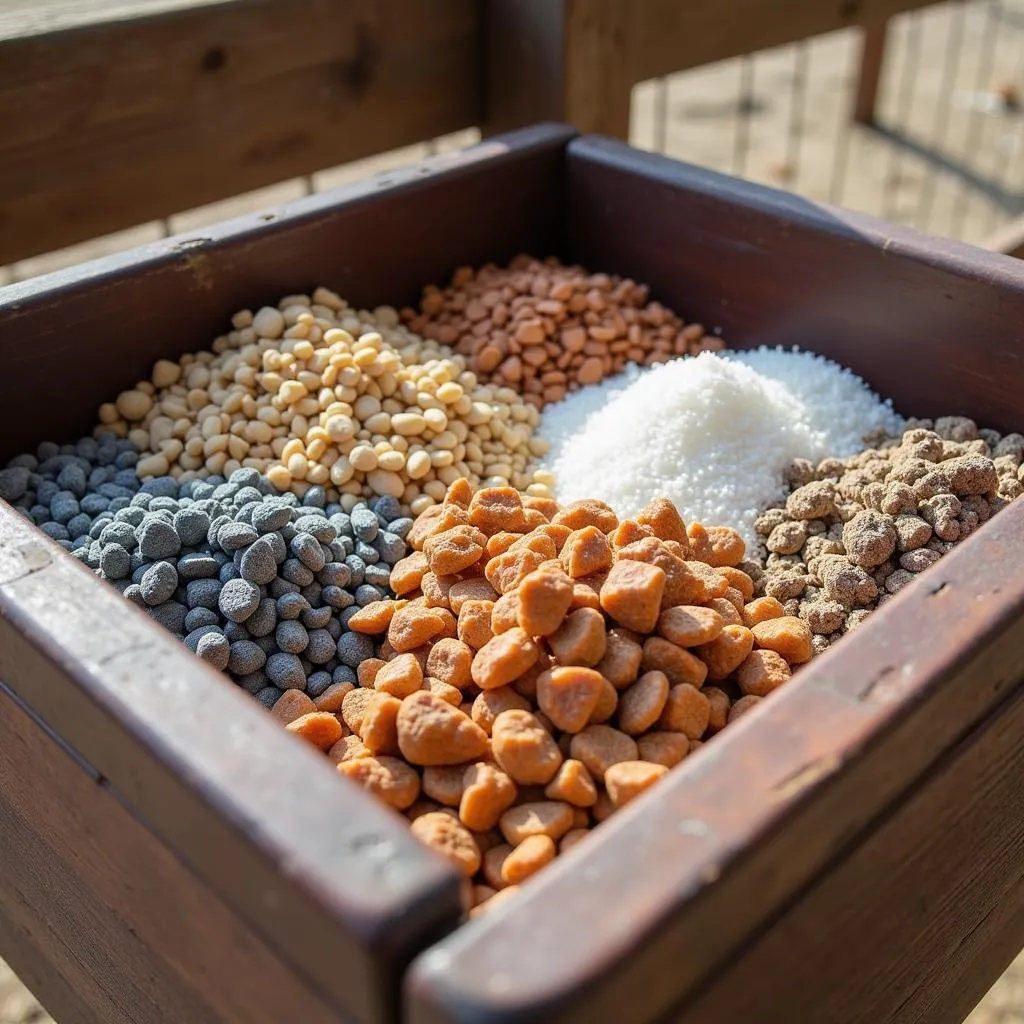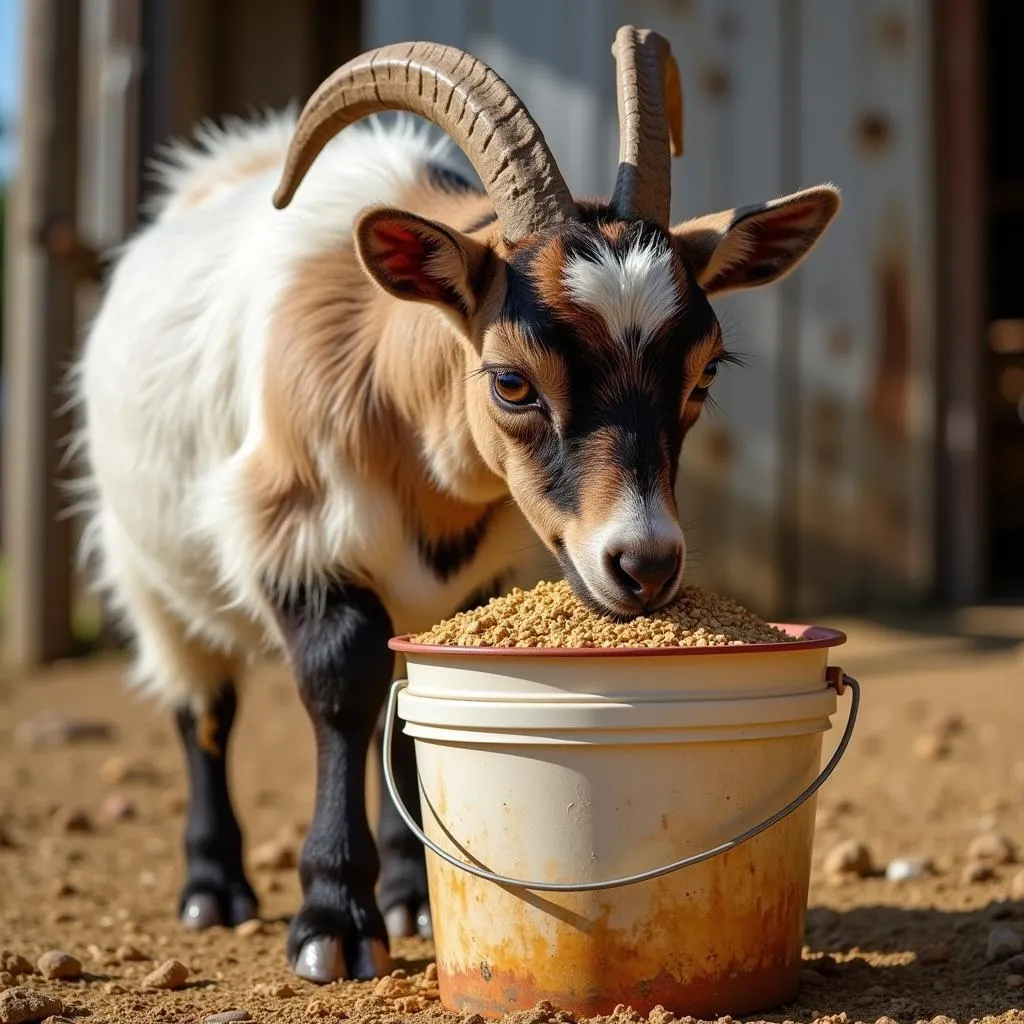Goat Food Supplements play a vital role in maintaining the health, productivity, and overall well-being of your herd. Whether you raise goats for milk, meat, fiber, or as beloved companions, providing them with the right nutritional support is essential. While a balanced diet of pasture, hay, and occasional treats forms the foundation of their nutritional needs, supplements can bridge the gap and address specific deficiencies.
 Goat mineral supplements in a feed trough
Goat mineral supplements in a feed trough
Understanding the Importance of Goat Food Supplements
Goats, like all living creatures, require a specific balance of vitamins, minerals, and other nutrients to thrive. While a natural diet can provide a significant portion of these, factors such as soil quality, seasonal changes, and individual health conditions can lead to nutritional gaps. This is where goat food supplements step in, providing targeted support to address these deficiencies and ensure optimal health.
For instance, goats are particularly susceptible to deficiencies in copper, selenium, and zinc, which are crucial for immune function, growth, and reproduction. Supplements containing these minerals can help prevent health issues and support overall well-being. Additionally, pregnant or lactating goats have increased nutritional demands that may not be fully met by their regular diet. Supplements formulated for these life stages can provide the extra boost they need to support healthy pregnancies and milk production.
Types of Goat Food Supplements
A wide variety of goat food supplements cater to different needs and life stages. These can be broadly categorized as follows:
Mineral Supplements:
These are among the most crucial supplements for goats, addressing common deficiencies in their diet. Look for supplements containing a balanced blend of:
- Macrominerals: Calcium, phosphorus, magnesium
- Microminerals: Copper, selenium, zinc, manganese, iodine
Vitamin Supplements:
While goats can obtain many vitamins from their diet, supplementation may be necessary in certain situations, such as during illness, stress, or periods of high demand.
- Vitamin A: Important for vision, growth, and immune function
- Vitamin D: Essential for calcium absorption and bone health
- Vitamin E: A powerful antioxidant that supports immune function
Protein Supplements:
Goats require adequate protein for muscle growth, milk production, and overall health.
- Soybean meal: A popular plant-based protein source
- Alfalfa pellets: High in protein and fiber
 Pregnant goat enjoying supplemental feed
Pregnant goat enjoying supplemental feed
Other Supplements:
- Probiotics: Support digestive health and nutrient absorption
- Yeast cultures: Can improve rumen function and feed efficiency
- Apple cider vinegar: Believed to have various health benefits, including aiding digestion and boosting the immune system
Choosing the Right Supplements for Your Goats
Selecting the appropriate goat food supplements depends on several factors:
- Age and Life Stage: Young, growing goats, pregnant or lactating does, and senior goats have different nutritional needs.
- Purpose: Goats raised for meat, milk, or fiber may benefit from specific supplements tailored to their production goals.
- Health Condition: Supplements can be used to address specific health concerns, such as mineral deficiencies or parasitic infections.
- Diet: The quality and composition of your goats’ regular diet will influence their supplement needs.
Consulting with a veterinarian or livestock nutritionist can help you determine the most appropriate supplements for your herd based on their individual needs and your local conditions.
Tips for Providing Supplements to Your Goats
- Introduce supplements gradually to avoid digestive upset.
- Offer supplements free-choice in a separate feeder, allowing goats to consume them as needed.
- Monitor intake and adjust the amount offered accordingly.
- Store supplements properly in a cool, dry place to maintain freshness and potency.
Conclusion
Goat food supplements are valuable tools for optimizing the health, productivity, and longevity of your herd. By understanding the importance of these supplements, the different types available, and how to choose the right ones, you can ensure your goats receive the nutritional support they need to thrive. Remember to consult with a veterinarian or livestock nutritionist for personalized advice and to address any specific concerns about your goats’ health and well-being.
FAQs about Goat Food Supplements
1. Can I give my goats human vitamin supplements?
It is not recommended to give goats human vitamin supplements as they may contain ingredients that are harmful to goats or in dosages that are not appropriate.
2. How much supplement should I give my goat?
The amount of supplement varies depending on the type of supplement, the age and weight of your goat, and their specific needs. Always follow the feeding guidelines provided on the supplement label and consult with your veterinarian.
3. What are the signs of mineral deficiency in goats?
Signs of mineral deficiency in goats can be varied and include poor growth, weight loss, decreased appetite, rough coat, and reduced milk production. If you suspect a deficiency, contact your veterinarian for diagnosis and treatment recommendations.
4. Can I make my own goat food supplements?
While it is possible to make some homemade goat food supplements, it is important to ensure they are properly balanced and formulated to meet your goats’ specific needs.
5. Where can I buy goat food supplements?
Goat food supplements can be purchased from feed stores, livestock supply companies, and online retailers specializing in goat care products.
You might also be interested in:
Need assistance with your goat care? Contact our team at Phone Number: 02437655121, Email: minacones@gmail.com Or visit us at: 3PGH+8R9, ĐT70A, thôn Trung, Bắc Từ Liêm, Hà Nội, Việt Nam. We offer 24/7 customer support.